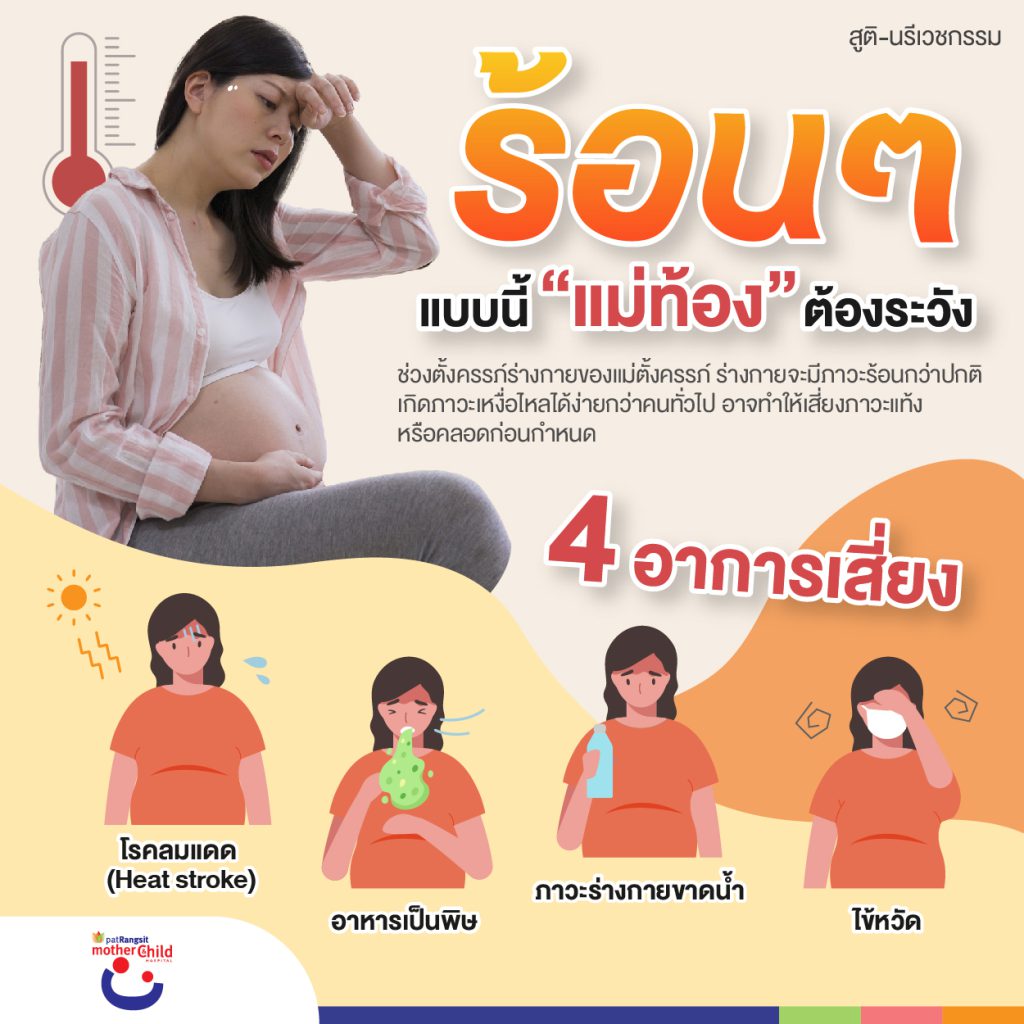
"Hot Summer Diseases" that pregnant women must be careful.
During pregnancy, the mother's body metabolizes food 20% better than normal people, causing the body to heat up and sweat easily. In the summer, there are more diseases that are likely to occur. Here are some recommendations for mothers to be concerned of in the summer.
Heat Stroke is caused by the body getting too much heat.
Symptoms: Fatigue, exhaustion, loss of appetite, headache, low blood pressure, etc. If not treated promptly, symptoms will get worse until convulsions, kidney failure, arrhythmia, shock, and thromboembolism, which can be life-threatening.
How to prevent + treat?
Dehydration
Dehydration occurs with heatstroke because when the body temperature rises, the body will sweat more than usual. It makes the blood more concentrated. This condition can stimulate the body to release the hormone oxytocin, which can result in premature labor.
Symptoms Dizziness, nausea, vomiting, fainting, hyperventilation or shortness of breath, muscle contractions or cramps, abnormal amount of fluid in the body such as sweat, low urine output, and elevated body temperature without other signs of illness.
How to prevent + treat?
Flu
If you have a cold during pregnancy, symptoms will get better a little later than normal people, because the immune system in the body is reduced. Most of the time, colds are not able to infect babies, but mothers should be careful. If mothers are infected with a severe cold, they may induce abortion in the first 3 months or preterm labor in the last trimester.
Symptoms: Coughing, sneezing, runny nose, not dangerous to baby. But when mother coughs hard, it may result in increased abdominal pressure, which may press on the uterus and cause the uterus to contract. If mothers have a fever higher than 38 degrees, they should see a doctor immediately. (Fever above 40 degrees can cause disabilities in babies.)
How to prevent + treat?
Cholera
It is caused by a bacterial infection in the intestines that may be contaminated with food and water.
Symptoms: diarrhea, vomiting, irritability, lethargy, sunken eyes, dry lips, extreme thirst, withered and dry skin, low urine output, and shock.
How to prevent + treat?
All the above symptoms are symptoms that expectant mothers may encounter. Therefore, keeping yourself healthy is essential to keep both mother and baby safe and healthy. If in case of abnormal symptoms, you should see a doctor immediately.
Source: Real Parenting magazine and website pobpad.com
Compiled by Dr. Suwannee Bamrerat

เรียบเรียงบทความโดย
พญ.สุวรรณี บำเรอราช

Get ready before stepping into the "Golden Age."
Menopause, also known as the "Golden Age," is a stage of life that brings physical and mental changes. It is caused by a decline in sex hormones, most of which are produced by the ovaries. As women age, ovarian function decreases, resulting in a gradual decrease in female hormone levels and various disorders in many body systems. Consulting with a specialist doctor can determine if you have entered menopause and how to receive appropriate treatment for maximum benefits.
What are the symptoms of entering the Golden Age?
Menopausal symptoms can be both physical and psychological and can last from a few days to several years, depending on the individual. Symptoms may begin before menopause, many years prior, or after menopause and gradually develop over time. These symptoms may come and go or persist continuously.
Physical symptoms commonly experienced during menopause include:
Psychological symptoms that may occur during menopause include:
How is menopause treated?
When entering menopause, it is important to seek advice from a specialist doctor regarding the following:
เว็บไซต์นี้มีการใช้งานคุกกี้ เพื่อเพิ่มประสิทธิภาพและประสบการณ์ที่ดีในการใช้งานเว็บไซต์ของท่าน